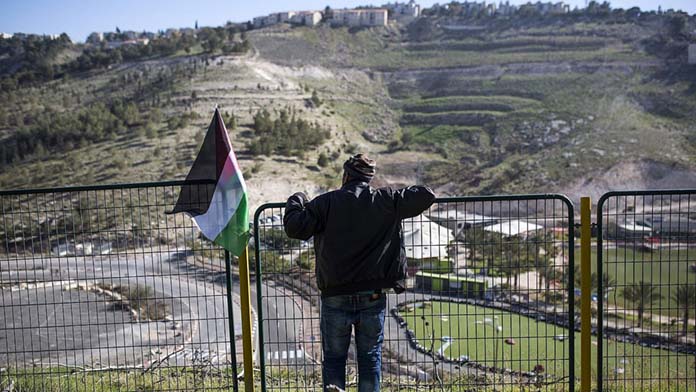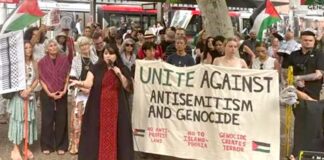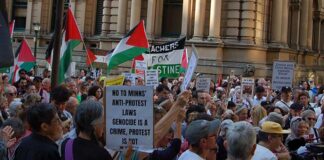Zionism emerged as a response to antisemitism in Europe but its aim of building a state with the support of imperialist powers has proven disastrous, writes Jacob Starling
In early 1905 a ferocious debate took place in Warsaw’s Great Synagogue. On one side was David Ben-Gurion, a member of Poale Zion and the future founder of the state of Israel. On the other was a young Jewish Socialist known as Shmulik, a representative of the General Jewish Labor Bund.
The subject of the debate was Zionism and the emancipation of the Jewish people.
The Bund argued that Jewish emancipation could be achieved only through socialist revolution, defeating the ruling class which stoked antisemitism and ushering in a tolerant and secular society.
Poale Zion by contrast dismissed the rising Russian revolutionary movement as a matter for Russian Gentiles and claimed that the only thing that could ensure the security of the Jewish people was a Jewish state in Palestine.
Socialism was far more popular among the Jewish communities of Eastern Europe than Zionism at the time.
In 1905 the Bund had 40,000 members across the Russian Empire. Two years earlier, the Zionist activist Chaim Weizmann had conceded that Zionism’s hardest struggle was against the Bund.
Today, after the horrors of the Holocaust, it seems like Zionism has won the argument. But the brutality unfolding in Gaza shows how disastrous Zionism has been.
Antisemitism and the Jewish State
It is impossible to understand the origins of Zionism without appreciating the pervasive and intensifying antisemitism in Europe at the end of the 19th century.
In the Russian Empire, home to the majority of the world’s Jewish population, the assassination of Tsar Alexander II in 1881 led the regime to begin a brutal antisemitic campaign.
Through the establishment of far-right militias known as the “Black Hundreds”, it carried out vicious pogroms against Jewish people to divert peasant unrest.
The regime published the Protocols of the Elders of Zion, an infamous forged document which purported to reveal an international Jewish conspiracy, a few years later. To this day, the far right continues to repeat its conspiratorial claims that Jews control the world through a secret cabal.
In France, the 1894 trial of Alfred Dreyfus, a Jewish army colonel, led to a shocking eruption of antisemitism. In 1898, violent antisemitic riots erupted in Paris and 22 professed antisemites were elected to the French Parliament.
It was the Dreyfus Affair in particular which shaped the views of Theodor Herzl, the father of Political Zionism. Herzl was an Austrian journalist who had become deeply disillusioned by the extent of antisemitism in Europe.
In 1896 he published The Jewish State, which outlined the core principles of Zionism. He argued that antisemitism was the inevitable result of Jews trying to integrate into wider society. Therefore, the only possible method of Jewish emancipation would be mass emigration to a new “Jewish State.”
Declaring antisemitism ingrained and incurable, Herzl said that he could now “understand and pardon it”. He concluded that not only was it a waste of time to fight antisemitism, but that it was in the interests of the Zionist movement to collaborate with antisemites.
Knowing that many Jews would not want to leave behind their lives in Europe, he needed to use the antisemitism in Europe to compel them to migrate.
In 1903, several months after the Kishinev pogrom in which 50 Jews were murdered, Herzl met Vyacheslav von Plehve, the Tsarist Minister who had organised the massacre.
When Plehve complained about the Bund, and the growing Jewish socialist movement, Herzl reassured him that they had a common interest in weakening it.
The Bund rightly accused him of collaborating with the regime to help it “disgorge its unwanted Jews”.
Zionists continually collaborated with antisemites. In 1933, the Zionist Congress of Germany sent the newly appointed Chancellor Adolf Hitler a memorandum of support. They reassured Hitler that they had a common interest in forcing Jews from Germany and that the Zionist movement would oppose the international anti-Nazi boycott.
Ben-Gurion himself opposed plans to help Jewish children emigrate from Germany to Britain.
He reasoned that if he had to pick between two options, one in which all the children in Germany could emigrate to Britain, and one in which half would die but half would emigrate to Israel, he would pick the second option. For Ben-Gurion, Jewish lives mattered less than the survival of his Zionist colony.
This reveals a contradiction at the heart of Zionism. The purported basis of Herzl’s Jewish state was that it would end antisemitism and ensure the safety of the Jewish people.
Yet Zionism has supported and refused to challenge antisemitism, increasing the danger that it poses to Jewish people.
Zionism and colonialism
Zionism’s aims would be possible only with the support of imperialism. Zionism was to be a colonial movement.
In The Jewish State, Herzl argued that the British Empire would benefit from a Jewish state in Palestine, describing it as a “rampart of Europe against Asia, an outpost of civilisation as opposed to barbarism”.
During the First World War, Britain and France secretly arranged to split the Middle East between them. France was to have a major stake in Palestine.
It was in this context that Chaim Weizmann pitched the idea of a Jewish state in Palestine to British Prime Minister David Lloyd George. He assured him that it would solidify British control of the Suez Canal and prevent Palestine falling into French hands.
Thus, in 1917, the Imperial War Cabinet published the Balfour Declaration, promising a “national homeland” for the Jewish people in Palestine.
The fact that this “national homeland” would be founded in a land already inhabited by the Palestinians did not faze the Zionists or their imperial patrons.
According to Lloyd George himself, “Zionism … is of far profounder import than the desires and prejudices of the 700,000 Arabs who now inhabit that ancient land.”
Britain allowed larger numbers of Jewish settlers to migrate to Palestine, which saw the Jewish population of the area increase from 5 per cent in 1914 to 30 per cent by 1945.
The Zionists’ aims would be realised in the Nakba of 1948, when more than 850,000 Palestinians were violently expelled from their homes in order to found the state of Israel.
As a colonial project, Zionism has always rested on racism and brutality. In a grotesque inversion of justice, Zionism claims that the security of one people can only be achieved by the disenfranchisement of another.
Zionism and “Eretz Israel”
Zionism isn’t just an inherently racist endeavour; from the outset it also pursued an expansionist agenda.
In 1918 the World Zionist Organisation submitted a map of “Eretz Israel” which extended north into the Golan Heights and South Lebanon, east into the West Bank and West Jordan, south into a small part of Saudi Arabia and west into the Gaza Strip and Eastern Egypt.
This map is based on a pseudo-historical reading of the Old Testament and claims to depict the Biblical Kingdom of David and Solomon at its greatest extent.
Although Ben-Gurion and the other Zionist leaders were largely non-religious, they recognised that religion could give legitimacy to what amounted to a crude land grab.
Understanding that the Palestinians and the surrounding Arab states saw the Zionists as European colonial invaders, Israel also set out to crush Arab resistance through military might.
Even when Ben-Gurion agreed to the UN Partition of Palestine in 1947, he secretly declared that Israel would not limit itself to these borders.
In 1948, Israel seized an area 38 per cent greater than under the UN partition plan, and in 1967 it went further, occupying the West Bank, the Golan Heights, the Gaza Strip and the Sinai Peninsula.
Although Israel agreed to leave the Sinai Peninsula in 1979, and withdrew its settlements from Gaza in 2005, the Likud Party, to which current Prime Minister Benjamin Netanyahu belongs, still views these as parts of Eretz Israel. And Israel’s blockade of Gaza means that its occupation of the Strip never really ended.
Although Israel aims to occupy as much land as possible, it also needs to ensure a demographic majority of Jews within its territory to maintain itself as an ethno-state.
Thus, the Indigenous inhabitants of the land must be removed, either through ethnic cleansing or outright extermination.
This was the motivation behind the Nakba of 1948 and today motivates the genocide in Gaza.
It is also why the West Bank has been held under Israeli military occupation for more than 50 years, as Israel has moved in Jewish settlers, forcibly expelled Palestinian villages and gradually colonised the area.
The socialist challenge
While Herzl’s conclusion from the Dreyfus Affair was that antisemitism was too pervasive to be defeated, the left’s response showed the opposite. In 1896, author Emile Zola released a ferocious open letter accusing the French government of antisemitism and arguing that Dreyfus’s conviction was a miscarriage of justice.
Zola was forced to flee the country, but his letter ignited an international campaign calling for the re-trial of Dreyfus.
This was a critical moment in the development of the socialist left. A popular movement forced the French Government to eventually exonerate Dreyfus. From this point on, the left would see antisemitism as one of its most dangerous opponents.
Zionism’s push for Jewish people to separate from their societies in Europe through establishing their own state in Palestine has been a dead end. It has produced ethnic cleansing and seen Israel become a violent oppressor of the Palestinians.
In the past six months, descendants of those who experienced the Holocaust have carried out a new genocide against Gaza.
Zionism has been a disastrous response to antisemitism. Anti-Jewish racism can be fought—as the history of Jewish radicalism and the left shows. It is rebuilding the socialist tradition that holds the hope for ending the colonial violence of Zionism and racism in all its forms.






